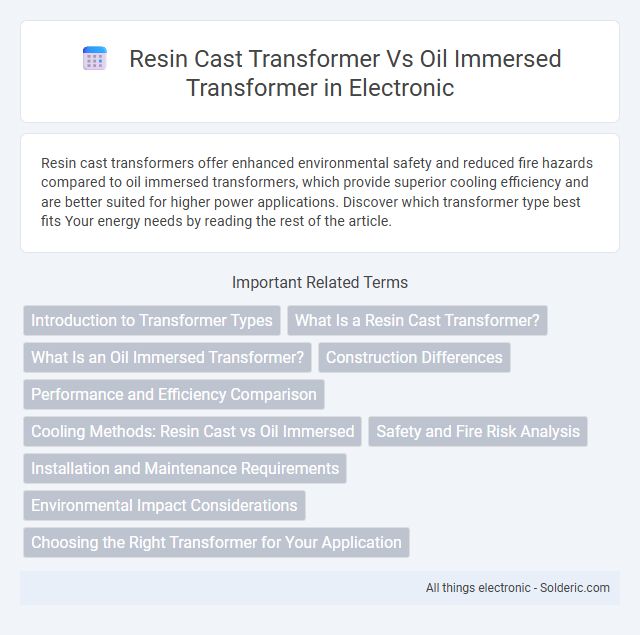Resin cast transformers offer enhanced environmental safety and reduced fire hazards compared to oil immersed transformers, which provide superior cooling efficiency and are better suited for higher power applications. Discover which transformer type best fits Your energy needs by reading the rest of the article.
Comparison Table
| Feature | Resin Cast Transformer | Oil Immersed Transformer |
|---|---|---|
| Insulation | Epoxy resin encapsulation | Mineral or synthetic oil |
| Cooling Method | Air cooled (natural or forced) | Oil cooled (natural or forced circulation) |
| Fire Risk | Low fire hazard, flame retardant | Higher fire risk due to combustible oil |
| Maintenance | Minimal, no oil testing needed | Regular oil testing and maintenance required |
| Environmental Impact | Eco-friendly, no oil leaks | Risk of oil leaks causing soil contamination |
| Size & Weight | Compact and lightweight | Bulkier and heavier |
| Application | Indoor, confined spaces, sensitive environments | Outdoor, heavy industrial use |
| Cost | Higher initial cost | Lower initial cost |
| Lifetime | Typically 20-30 years | Typically 25-40 years |
| Fault Tolerance | Resistant to moisture and vibration | More susceptible to oil degradation and leaks |
Introduction to Transformer Types
Resin cast transformers utilize epoxy resin to encase windings, providing superior moisture and dust resistance, ideal for harsh environments and compact installations. Oil immersed transformers rely on insulating oil to cool and insulate, offering excellent heat dissipation and long-term durability for higher load capacities. Your choice depends on application needs, environmental conditions, and maintenance preferences.
What Is a Resin Cast Transformer?
A resin cast transformer is an electrical device where the windings are encapsulated in epoxy resin to provide insulation and protection against moisture, dust, and environmental contaminants. This type of transformer offers enhanced durability, reduced maintenance, and better resistance to mechanical shocks compared to oil immersed transformers. Unlike oil immersed transformers that rely on insulating oil for cooling and insulation, resin cast transformers use solid insulation, making them safer and more suitable for indoor or environmentally sensitive applications.
What Is an Oil Immersed Transformer?
An oil immersed transformer uses mineral oil as an insulating and cooling medium, enhancing heat dissipation and electrical insulation between internal components. This design improves the transformer's performance by maintaining lower operating temperatures and protecting windings from moisture and contaminants. Oil immersed transformers are commonly used in high-voltage and outdoor applications due to their reliability and efficient thermal management.
Construction Differences
Resin cast transformers feature windings encapsulated in epoxy resin, providing superior insulation and enhanced resistance to moisture, dust, and mechanical stress, while oil-immersed transformers use mineral oil for cooling and insulation within a sealed tank. The solid insulation in resin cast transformers eliminates the risk of oil leaks and reduces fire hazards, whereas oil-immersed transformers rely on circulation of the oil to dissipate heat generated during operation. These construction differences result in resin cast transformers being more compact, maintenance-free, and suitable for indoor installations, contrasting with the larger size and regular oil maintenance requirements of oil-immersed transformers.
Performance and Efficiency Comparison
Resin cast transformers exhibit superior performance in moisture resistance and mechanical strength, making them ideal for harsh environments and reducing maintenance needs. Oil immersed transformers typically achieve higher efficiency in high-capacity applications due to better cooling properties, enabling greater load handling and longer lifespan. Efficiency differences also arise from thermal management, with resin cast models offering stable operation at lower losses in medium-voltage settings while oil immersed types excel in heavy-duty industrial uses.
Cooling Methods: Resin Cast vs Oil Immersed
Resin cast transformers utilize solid epoxy resin for insulation and natural convection cooling, making them maintenance-free and ideal for harsh environments. Oil immersed transformers rely on mineral oil for insulation and cooling, using oil circulation and external radiators to dissipate heat efficiently. Your choice depends on maintenance preferences and cooling requirements specific to the application.
Safety and Fire Risk Analysis
Resin cast transformers offer enhanced safety due to their solid insulation, reducing the risk of oil leaks and fire hazards commonly associated with oil immersed transformers. The absence of flammable liquid in resin cast units minimizes fire risk, making them ideal for indoor or densely populated areas. Your choice of transformer impacts overall safety protocols, especially where fire prevention is critical.
Installation and Maintenance Requirements
Resin cast transformers offer simpler installation due to their compact, lightweight design and do not require oil handling, reducing environmental and safety concerns. Maintenance is minimal as these transformers are sealed units with no need for oil testing or replacement, leading to lower long-term upkeep costs. In contrast, oil immersed transformers require careful oil management, periodic oil quality testing, and more extensive inspection procedures to monitor potential leaks and degradation.
Environmental Impact Considerations
Resin cast transformers offer significant environmental benefits by eliminating the use of oil, thereby reducing the risk of leaks and soil contamination, which are common concerns with oil-immersed transformers. Their solid insulation and sealed design minimize fire hazards and simplify disposal processes, aligning with stricter environmental regulations for sustainable electrical infrastructure. Oil-immersed transformers, while effective in cooling, pose challenges due to potential oil spills and the need for careful handling and recycling of mineral oil, impacting ecosystems and increasing environmental management costs.
Choosing the Right Transformer for Your Application
Resin cast transformers offer excellent insulation, compact size, and superior resistance to moisture and environmental contaminants, making them ideal for harsh or outdoor applications. Oil immersed transformers, known for efficient cooling and high fault tolerance, perform well in high voltage and heavy-load scenarios where heat dissipation is critical. Assess your application's environmental conditions, load requirements, and maintenance needs to choose the right transformer that ensures reliability and longevity.
resin cast transformer vs oil immersed transformer Infographic

 solderic.com
solderic.com